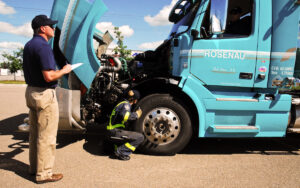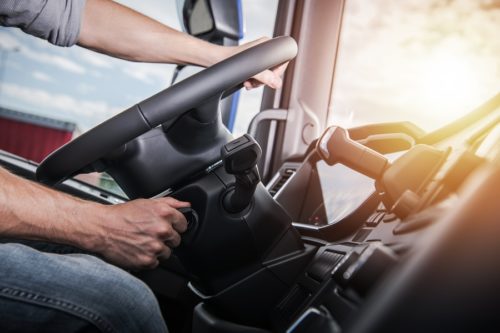 Tractor-trailers are used everywhere in the USA. They connect factories to cities and towns, they bring us our food and groceries and even deliver fuel to our communities. Trucks are an important part of our economic infrastructure and our lives would differ vastly without them. But a frightening aspect of trucking becomes apparent if you look at the details: Trucks carry an incredible amount of weight at relatively high speeds.
Tractor-trailers are used everywhere in the USA. They connect factories to cities and towns, they bring us our food and groceries and even deliver fuel to our communities. Trucks are an important part of our economic infrastructure and our lives would differ vastly without them. But a frightening aspect of trucking becomes apparent if you look at the details: Trucks carry an incredible amount of weight at relatively high speeds.
Unlike rail systems, trucks are not relegated to one lane of directional travel, either. They share the same stretches of road the rest of us use, complete with obstacles, potholes, distracted drivers, and all the other variables that make flying in an airplane a lot safer than driving in a car every day.
Truck drivers generally have to pass a Commercial Driver’s License test to even get to drive their vehicles, which entails a lot more technical know-how than the overage passenger vehicle. But these drivers are just like the rest of us. They have physical limitations when it comes to the amount of time they are in their tractor-trailer, they suffer from fatigue from being on the road too long, and like the rest of us, unfortunately, truck drivers make mistakes and cause accidents.
Sometimes these mistakes are deadly.
Dangers of Trucking
Tractor-trailers haul incredible amounts of weight over long distances. As a result, they are subject to mechanical breakdowns which may affect the safety of other drivers and passengers, not to mention the safety of the truck drivers themselves. In Kentucky, such a large portion of the area in which we live is in some pretty rugged terrain. Mountains, river valleys, dense forests, and unpredictable weather cycles due to topography are a trucker’s nightmare.
Trucks are built to travel these distances and handle a wide range of climates, topography, and perform these tasks while providing visibility to the driver as well as enough power to pull immense loads at relatively high speeds. Unfortunately, trucks have to be built in such a way to be one-size-fits-all tools for transportation. Tractors connect with all sorts of trailers, which have connected with countless over tractors over their lifetimes. They do this over and over again, which poses problems when dealing with traveling the roads.
Those problems produce truck collisions in the Bluegrass State—almost 10,000 a year in recent years, sometimes more. Truck accidents kill between 74 and 114 people a year during a recent decade.
Maintenance and Upkeep
Trucks need regular maintenance to ensure proper functionality. Typically, engines are maintained within parameters of machine hours, with routine oil changes, overhauls, and replacement of parts being regular. Unfortunately, this kind of upkeep is also very expensive, and though a fleet may have a mechanic on its staff to perform these tasks, a lot of independent OTR drivers don’t often maintain their vehicles as they should.
This can lead to other problems.
- Trailer hitch failures
- Burned/damaged brakes
- Worn tires
- Damaged suspension
- Improperly functioning lights and signals
- Malfunctioning sand/chain devices
- Damaged or clouded windshields
- Burned on oil/fuel leaks
Any number of these maintenance items can lead to serious problems down the road. With constant weather changes on winding mountain roads, a truck must be in tip-top condition, otherwise, it becomes a hazard to other drivers. A broken or malfunctioning trailer hitch could mean the loss of a trailer at high speeds, which could wind up turning a truck over on its side, or simply losing the trailer entirely and having it veer into other motorists.
The Driver
Take all of the elements of a tractor-trailer and put them together and not one single piece of equipment is more crucial than the human element. The driver is what takes several tons of high-horsepower machinery and maneuvers it down the road without harming other people. Ideally, the driver is a highly-skilled heavy equipment operator who has earned their license. They should know exactly what their vehicle is capable of doing, and their experience on the road should reflect their profession. Most of the time it does, however, there are times that a truck driver becomes the most dangerous element of a tractor-trailer.
Driving under the influence: Substance abuse has always plagued the trucking industry. Beginning in its early days when drivers would indulge in drinking alcohol to “take the edge off” long, stressful trips over the road, people have relied on chemical dependence to cope with the rigors of trucking. More commonly, however, truck drivers have resorted to mega-dosing caffeine or other energy drinks, while still others use stimulants such as amphetamines to stay awake and alert on long hauls. Especially overnight or to improve on driving performance to meet deadlines.
Being under the influence of alcohol or narcotics is highly illegal and can impair one’s ability to operate heavy equipment. If you have been involved in a tractor-trailer accident and you suspect alcohol or drug use, notify the police immediately and contact your attorney if you have been injured in an accident.
Experience: It is nice to think that all truck drivers are cut from the same cloth, but that just isn’t the case. Truck drivers come in all shapes and sizes. Some of them are extremely knowledgeable in their profession, drawing from a career of experiences that help them navigate the roads of America with confidence and capability. However, some drivers are simply inexperienced or maybe just not cut out for the profession. They may lack cognitive abilities or have good judgment when it comes to navigating roads they are unfamiliar with. An experienced driver not only knows how to handle their truck in normal operating conditions but also possesses the know-how to maneuver the truck safely if there are hazards, to limit the potential for loss of life or injury to themselves or others. This is usually a talent that is cultivated by experience. Unfortunately, experience is often in short supply with some drivers.
Every road is different: A driver who isn’t used to a sudden change in road grade might burn their brakes and find they are no longer in control of their vehicle. Another driver might allow themselves to be distracted by their smartphone or other electronics, passing the time on a long and lonely road. Looking away from the road for just one second is sometimes all it takes to cause an accident or fatality. A lot of accidents occur when a driver takes the terrain of a road for granted and misjudges a soft shoulder or isn’t paying attention on a blind curve that also happens to be a deer crossing.
Speed kills: Many trucks have governors on their motors that prevent excessive speeds, usually limiting a truck to the local speed limit, if not a few miles per hour below. Usually larger trucking companies do this to reduce insurance costs on their fleet. Independent trucking owner/operators may not have such devices, relying instead on their drivers’ judgments and experience on the road. Excessive speed is often the culprit in trucking accidents, mostly due to a truck’s inability to reduce speed quickly when necessary, or the sheer amount of force behind a truck at high speeds carrying a load.
Some contributors to high-speed accidents include:
- Animal impacts
- Rollovers due to over-correction
- Failed brakes on inclines
- Collisions with other vehicles
- Crossing the median
- Swerving out of control during a blowout
- Fires due to seized parts/overheating
- Loss of control in high winds
- Inability to stop on wet/icy surfaces
- Unfamiliarity with terrain
Four Actions to Take in Case of an Accident
In Kentucky, there is a protocol to follow when dealing with accidents. First and foremost, preventing further injury or addressing existing injuries is the main concern.
- Remain calm. In spite of adrenaline and potential injuries to yourself or others, you need to remain calm. Not only will this allow you to assess the next steps, but it might also reduce your chances of shock if you are injured.
- Make sure injuries and safety are assessed. Treating injuries is your first priority, determining blame and assessing damage much further down the list. Getting the injured to adequate facilities to treat them is crucial. Saving life and limb is the most important step.
- Get the vehicles clear from the road if possible. Reduces the chances for other people to be injured and pull off the road. If your vehicle is incapacitated, which is likely in a collision with a truck, assess any injuries you might have. If they are serious, and you are safe staying in your vehicle, then do so. Otherwise, stay away from the accident and try to warn others with markers, flares, or other safety equipment if available.
- Gather information. Get any information you can about the vehicle and driver of the truck. They are required to provide registration information to you, as well as names of the owner, driver, passengers and insurance carrier of the vehicles. Get as much information as you can.
Pro-tip: One way to navigate this is by using your smartphone to take pictures or video of the scene of the accident, rather than trying to write them down. You can go back to this information later.
You can take pictures of:
- Proof of insurance
- Vehicle registration information
- Damage to the vehicle
- Details of the accident
- For address information, snap a pic of any driver’s licenses of those involved
Or you can simply write the information down if you have a pen and paper handy.
How a Truck Accident Lawyer Can Help
Recovery from an accident is a serious undertaking, one that insurance companies are not usually sympathetic toward. Your injury was a traumatic event. Lives change forever after a tractor-trailer accident.
Insurance companies only care about their bottom line. Lives are assessed on actuary tables and when a truck driver, or especially if the accident was a result of a driver being pressured to perform beyond the scope of their capabilities, thus putting you and your loved ones at risk. Whether truckers abuse substances to drive longer or a company simply hires drivers who lack the ability or training to handle that rig, someone is liable, and you should recover compensation for what you lost.
Cutting corners is no excuse to affect the lives of others. It takes a lot to navigate hundreds of thousands of pounds down a 14-foot wide section of road at a mile per minute. Which is why the elements addressed above are so crucial. The breakdown of just a handful of them is a recipe for disaster.
Kentucky is one of the most beautiful states in the country, and its highways, roads, mountains, and valleys offer some of the most challenging topography tractor-trailer drivers have faced. With unpredictable weather, a variety of other drivers, and an entire system of moving parts making up a truck and its trailer, there are too many factors at play to let negligence be one of them—so contact a truck accident lawyer if you or someone you know were injured in a tractor-trailer accident.

